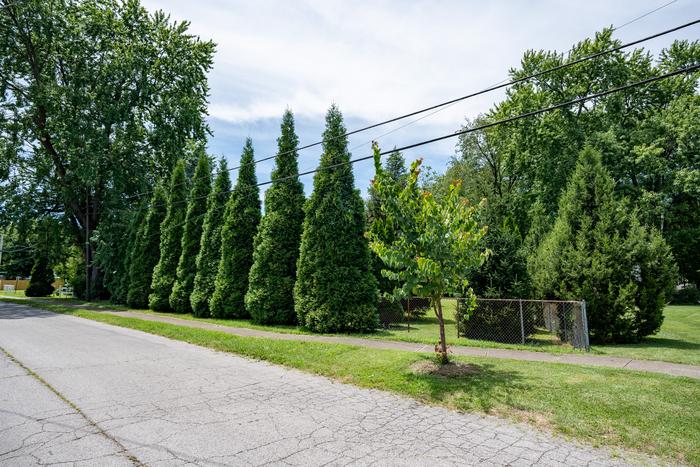LOUISVILLE, Ky. – The University of Louisville’s groundbreaking Green Heart Louisville Project has found that people living in neighborhoods where the number of trees and shrubs was more than doubled showed lower levels of a blood marker of inflammation than those living outside the planted areas. General inflammation is an important risk indicator for heart disease and other chronic diseases.

Credit: Mike Wilkinson for The Nature Conservancy
LOUISVILLE, Ky. – The University of Louisville’s groundbreaking Green Heart Louisville Project has found that people living in neighborhoods where the number of trees and shrubs was more than doubled showed lower levels of a blood marker of inflammation than those living outside the planted areas. General inflammation is an important risk indicator for heart disease and other chronic diseases.
The Christina Lee Brown Envirome Institute launched the first-of-its-kind project in 2018 in partnership with The Nature Conservancy, Washington University in St. Louis, Hyphae Design Laboratory and others to study whether and how living among more densely greened surroundings contributes to better heart health. The design of the study closely mirrors clinical trials which test whether medical treatments are effective. The team applied the treatment – the addition of large trees and shrubs – to some participants’ neighborhoods but not to others. They then compared residents’ health data to see how the addition of the trees affected their health.
“The Green Heart Louisville Project is an excellent example of how our university’s innovative and collaborative researchers are working to improve lives in our community and far beyond,” UofL President Kim Schatzel said. “Trees are beautiful, but these results show that the trees around us are also beneficial to individual and community health. Through this and many other projects, the Envirome Institute is improving health at the community level, not just for individuals, but for everyone living in a neighborhood.”
To understand the state of community’s health at the start of the study, researchers took blood, urine, hair and nail samples and documented health data from 745 people living in a four-square-mile area of south Louisville. The researchers also took detailed measurements of tree coverage and levels of air pollution in the area.
Following this baseline data collection, the Envirome Institute worked with The Nature Conservancy and a host of local partners and contractors to plant more than 8,000 large trees and shrubs in designated neighborhoods within the project area. Those living in the greened area were considered the treated population and the results obtained from this population were compared with residents of adjacent neighborhoods, where the project team did not plant any trees.
After the plantings, the research team reassessed residents’ health. They found that those living in the greened area had 13-20% lower levels of a biomarker of general inflammation, a measure called high-sensitivity C-reactive protein (hsCRP) than those living in the areas that did not receive any new trees or shrubs. Higher levels of hsCRP are strongly associated with a risk of cardiovascular disease and are an even stronger indicator of heart attack than cholesterol levels. Higher CRP levels also indicate a higher risk of diabetes and certain cancers.
A reduction of hsCRP by this percentage corresponds to nearly 10-15% reduction in the risk of heart attacks, cancer or dying from any disease.
“These results from the Green Heart Louisville Project indicate that trees contribute more to our lives than beauty and shade. They can improve the health of the people living around them,” said Aruni Bhatnagar, director of the Envirome Institute and UofL professor of medicine. “Although several previous studies have found an association between living in areas of high surrounding greenness and health, this is the first study to show that a deliberate increase in greenness in the neighborhood can improve health. With these results and additional studies that we hope to report soon, we are closer to understanding the impact of local tree cover on residents’ health. This finding will bolster the push to increase urban greenspaces.”
As more is known about the health impacts of increased tree cover, increased greening in cities may emerge as a key method to improve public health.
“Most of us intuitively understand that nature is good for our health. But scientific research testing, verifying and evaluating this connection is rare,” said Katharine Hayhoe, chief scientist of The Nature Conservancy. “These recent findings from the Green Heart Project build the scientific case for the powerful connections between the health of our planet and the health of all of us.”
Earlier in August, the Green Heart Louisville Project was awarded an additional $4.6 million in funding from the National Institute of Environmental Health Sciences to support continued research over the next five years.
These findings were presented by Daniel Riggs, UofL assistant professor of environmental medicine, at the 36th Annual Conference of the International Society for Environmental Epidemiology in Santiago, Chile on Aug. 26.



